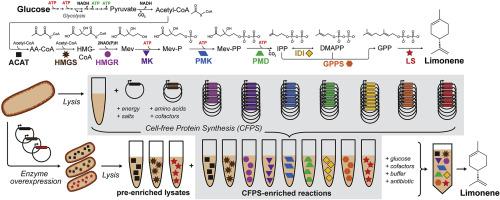Metabolic Engineering ( IF 8.4 ) Pub Date : 2020-05-25 , DOI: 10.1016/j.ymben.2020.05.006 Quentin M Dudley 1 , Ashty S Karim 1 , Connor J Nash 1 , Michael C Jewett 1

|
Metabolic engineering of microorganisms to produce sustainable chemicals has emerged as an important part of the global bioeconomy. Unfortunately, efforts to design and engineer microbial cell factories are challenging because design-build-test cycles, iterations of re-engineering organisms to test and optimize new sets of enzymes, are slow. To alleviate this challenge, we demonstrate a cell-free approach termed in vitro Prototyping and Rapid Optimization of Biosynthetic Enzymes (or iPROBE). In iPROBE, a large number of pathway combinations can be rapidly built and optimized. The key idea is to use cell-free protein synthesis (CFPS) to manufacture pathway enzymes in separate reactions that are then mixed to modularly assemble multiple, distinct biosynthetic pathways. As a model, we apply our approach to the 9-step heterologous enzyme pathway to limonene in extracts from Escherichia coli. In iterative cycles of design, we studied the impact of 54 enzyme homologs, multiple enzyme levels, and cofactor concentrations on pathway performance. In total, we screened over 150 unique sets of enzymes in 580 unique pathway conditions to increase limonene production in 24 h from 0.2 to 4.5 mM (23–610 mg/L). Finally, to demonstrate the modularity of this pathway, we also synthesized the biofuel precursors pinene and bisabolene. We anticipate that iPROBE will accelerate design-build-test cycles for metabolic engineering, enabling data-driven multiplexed cell-free methods for testing large combinations of biosynthetic enzymes to inform cellular design.
中文翻译:

使用无细胞蛋白质合成进行柠檬烯生物合成的体外原型设计。
微生物代谢工程生产可持续化学品已成为全球生物经济的重要组成部分。不幸的是,设计和设计微生物细胞工厂的努力具有挑战性,因为设计-构建-测试循环、重新设计生物体以测试和优化新酶组的迭代速度缓慢。为了缓解这一挑战,我们展示了一种称为体外的无细胞方法生物合成酶(或 iPROBE)的原型设计和快速优化。在 iPROBE 中,可以快速构建和优化大量通路组合。关键思想是使用无细胞蛋白质合成 (CFPS) 在单独的反应中制造途径酶,然后混合以模块化组装多个不同的生物合成途径。作为模型,我们将我们的方法应用于大肠杆菌提取物中柠檬烯的 9 步异源酶途径. 在设计的迭代循环中,我们研究了 54 种酶同系物、多种酶水平和辅因子浓度对通路性能的影响。总的来说,我们在 580 种独特的途径条件下筛选了 150 多种独特的酶,以在 24 小时内将柠檬烯的产量从 0.2 增加到 4.5 mM(23–610 mg/L)。最后,为了证明该途径的模块化,我们还合成了生物燃料前体蒎烯和红没药烯。我们预计 iPROBE 将加速代谢工程的设计-构建-测试周期,使数据驱动的多路无细胞方法能够测试生物合成酶的大量组合,为细胞设计提供信息。



























 京公网安备 11010802027423号
京公网安备 11010802027423号